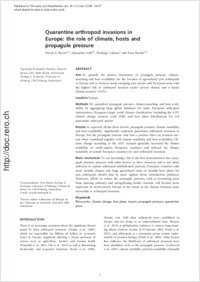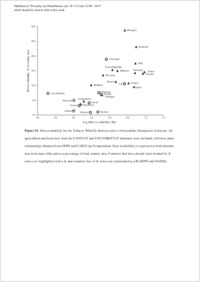Quarantine arthropod invasions in Europe: the role of climate, hosts and propagule pressure
- Bacon, Steven J. Agroscope Reckenholz-Tänikon, Research Station ART, Zürich, Switzerland - Ecology & Evolution, University of Fribourg, Switzerland
- Aebi, Alexandre Agroscope Reckenholz-Tänikon, Research Station ART, Zürich, Switzerland - Laboratoire de Biologie du Sol, Université de Neuchâtel, Switzerland
- Calanca, Pierluigi Agroscope Reckenholz-Tänikon, Research Station ART, Zürich, Switzerland
- Bacher, Sven Ecology & Evolution, University of Fribourg, Switzerland - Laboratoire de Biologie du Sol, Université de Neuchâtel, Switzerland
-
2013
Published in:
- Diversity and Distributions. - 2014, vol. 20, no. 1, p. 84-89
English
Aim: To quantify the relative importance of propagule pressure, climate-matching and host availability for the invasion of agricultural pest arthropods in Europe and to forecast newly emerging pest species and European areas with the highest risk of arthropod invasion under current climate and a future climate scenario (A1F1).Location: Europe.Methods: We quantified propagule pressure, climate-matching and host availability by aggregating large global databases for trade, European arthropod interceptions, Koeppen–Geiger world climate classification (including the A1F1 climate change scenario until 2100) and host plant distributions for 118 quarantine arthropod species.Results: As expected, all the three factors, propagule pressure, climate suitability and host availability, significantly explained quarantine arthropod invasions in Europe, but the propagule pressure only had a positive effect on invasion success when considered together with climate suitability and host availability. Climate change according to the A1F1 scenario generally increased the climate suitability of north-eastern European countries and reduced the climate suitability of central European countries for pest arthropod invasions.Main conclusions: To our knowledge, this is the first demonstration that propagule pressure interacts with other factors to drive invasions and is not alone sufficient to explain arthropod establishment patterns. European countries with more suitable climate and large agricultural areas of suitable host plants for pest arthropods should thus be more vigilant about introduction pathways. Moreover, efforts to reduce the propagule pressure, such as preventing pests from entering pathways and strengthening border controls, will become more important in north-eastern Europe in the future as the climate becomes more favourable to arthropod invasions.
- Faculty
- Faculté des sciences et de médecine
- Department
- Département de Biologie
- Language
-
- English
- Classification
- Ecology and biodeversity
- License
- License undefined
- Identifiers
-
- RERO DOC 208705
- DOI 10.1111/ddi.12149
- Persistent URL
- https://folia.unifr.ch/unifr/documents/303411
Other files
Statistics
Document views: 87
File downloads:
- bac_qai.pdf: 142
- bac_qai_sm.pdf: 93
- ddi12149-sup-0002-tables1.txt: 37
- ddi12149-sup-0006-tables5.txt: 54
- ddi12149-sup-0007-tables6.txt: 47
- ddi12149-sup-0008-tables7.txt: 36
- tables7_1950-2000.txt: 35
- tables7_2001-2025.txt: 36
- tables7_2026-2050.txt: 47
- tables7_2051-2075.txt: 41
- tables7_2076-2100.txt: 30


